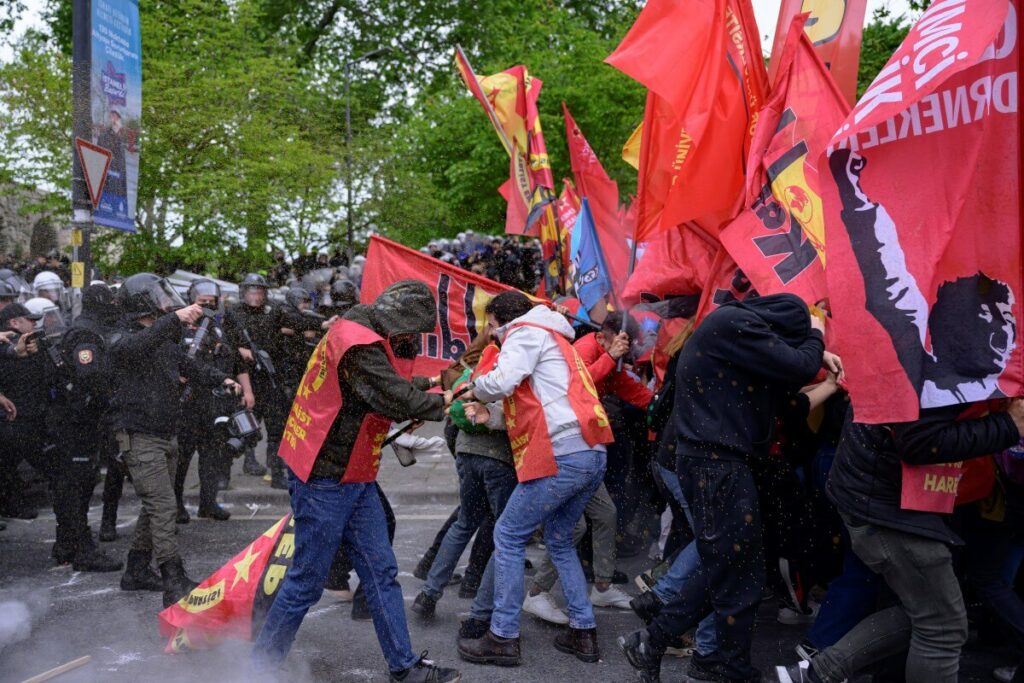Turkish police on Friday detained 29 people who had resisted law enforcement on Wednesday in an attempt to hold a demonstration in İstanbul’s central Taksim Square to mark International Workers’ Day despite a government ban, the interior minister has announced.
Ali Yerlikaya announced on X on Friday that 29 people who attempted to march from İstanbul’s Saraçhane neighborhood to Taksim Square on May Day by trying to break through the police blockade have been detained.
The minister also said the demonstrators who were taken into custody on Friday had attacked the police with rocks and sticks, adding that they were identified based on video recordings and facial recognition technology.
GEREĞİ YAPILDI – 13 A
1 Mayıs Emek ve Dayanışma Günü’nde İstanbul’da Taksim Meydanına çıkmak için SARAÇHANE Meydanında toplanan ve polislerimize taşlı sopalı saldırıda ve fiziki müdahalede bulunan 2️⃣9️⃣ şüpheli olaydan sonra kaçtıkları adreslerde bugün yakalandı.
Kamera… pic.twitter.com/IvXNAVXEvn
— Ali Yerlikaya (@AliYerlikaya) May 3, 2024
The İstanbul branch of the Progressive Lawyers Association (ÇHD) also announced the detentions on X, saying that detention warrants had been issued for 47 people for “resisting the illegitimate ban on Taksim Square on May Day.”
1 Mayıs'ta hukuksuz Taksim yasağına karşı direndikleri gerekçesiyle 47 kişinin evinin basıldığı bilgisini aldık. Gözaltıların takibi için Vatan Emniyet'e geçeceğiz.
AYM kararını ihlal edenler hukuktan bahsedemez! Yaşasın 1 Mayıs!
— ÇHD İstanbul Şube (@CHDistanbul) May 3, 2024
The detainees include members of the Left Party and some socialist groups who wanted to march from Saraçhane to Taksim but faced a heavy police presence and a blockade.
The ÇHD said those who violate a Constitutional Court ruling on rights violations in the ban on Taksim Square on May Day can’t talk about the law.
In addition to representatives from major unions such as the Confederation of Progressive Trade Unions (DİSK), the Confederation of Public Sector Trade Unions (KESK) and many professional organizations, the main opposition Republican People’s Party (CHP), several left-wing and socialist parties called on people to gather in Saraçhane on Wednesday from where a march would be held to Taksim Square to mark International Workers’ Day.
Their decision came in defiance of a ban imposed by the İstanbul Governor’s Office, which allowed May Day demonstrations only in other venues across the city. However, labor unions and a number of political parties said Taksim has symbolic importance for May Day and that the government ban contravenes a Constitutional Court decision last year that found violations of the right to free assembly in the controversial ban.
The march to Taksim was cancelled by the CHP and some labor unions due to the police blockade, leading to criticism from various political parties and activists and leaving other demonstrators in the area disappointed.
Skirmishes erupted when a group of demonstrators wanted to march to Taksim Square, leading to the detention of 217 of them, according to another statement from Yerlikaya.
Among them, 182 have been released, while 35 had been referred to court as of Friday.
İstanbul Governor Davut Gül attracted criticism when he tweeted about the detention of more than 200 people in İstanbul on May Day, saying: “No crime is left without punishment. 210 people have been detained. The state may postpone it [punishing a crime], but it never leaves it unpunished.”
The criticism against Gül stemmed from his decision to treat May Day demonstrators who wanted to exercise a democratic right as criminals.
Taksim Square, which has symbolic importance for demonstrators due to the killing of 34 people by unknown assailants on May Day in 1977, has become a subject of tension and confrontation between the government and labor unions in the days leading up to May Day since 2013.
Until 2009, Taksim was off limits to demonstrators following Bloody May Day in 1977. About three decades after the incident, under tight security, Taksim Square became the venue of peaceful demonstrations aside from a few minor incidents in 2010, 2011 and 2012. The area was closed to demonstrations again in 2013 out of security concerns.

